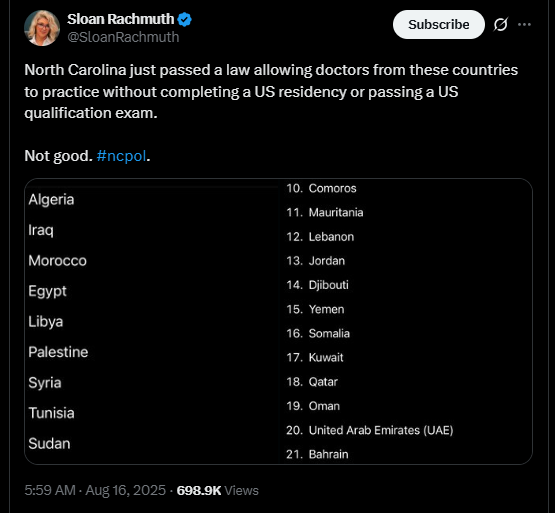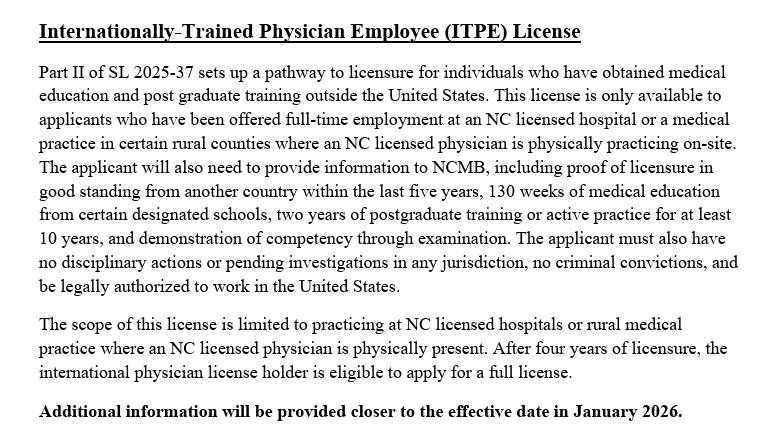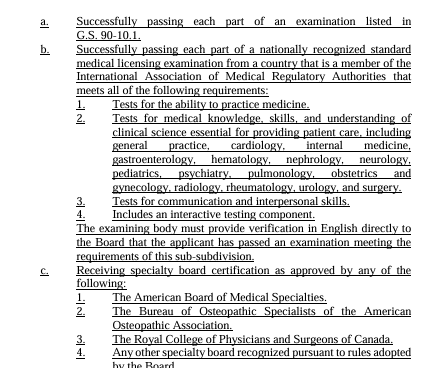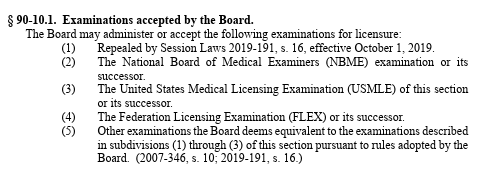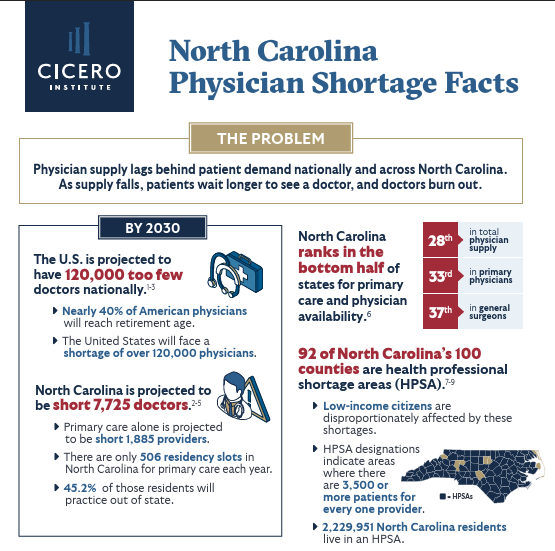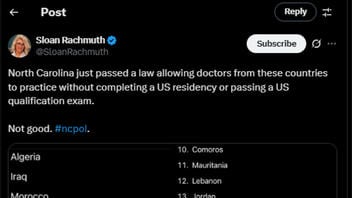
Did North Carolina pass a law allowing foreign doctors to practice medicine in that state without taking a U.S. qualification exam? No, that's not true: The legislation, which was signed into law by North Carolina's governor on July 1, 2025, addresses a severe shortage of primary physicians at the state's rural hospitals by giving non-U.S.-trained doctors "new licensure pathways," according to the North Carolina Medical Board. The law requires foreign doctors to not only have passed their own country's medical qualification exam, but another test chosen by the North Carolina Medical Board. The doctors could only practice in the rural hospital where they are hired and they must be supervised by another licensed physician.
The claim appeared in a post (archived here) shared on X on August 16, 2025. It read:
North Carolina just passed a law allowing doctors from these countries to practice without completing a US residency or passing a US qualification exam. Not good. #ncpol.
This is what the post looked like at the time of writing:
(Source: screenshot of X.com by Lead Stories)
The law does not list the 21 Middle Eastern countries included in the post, or any specific countries. It only refers to any physician who did not graduate from a U.S. medical school.
This is a summary (archived here) of the law provided by the North Carolina Medical Board, which is charged with administering the program:
Part II of SL 2025-37 sets up a pathway to licensure for individuals who have obtained medical education and post graduate training outside the United States. This license is only available to applicants who have been offered full-time employment at an NC licensed hospital or a medical practice in certain rural counties where an NC licensed physician is physically practicing on-site. The applicant will also need to provide information to NCMB, including proof of licensure in good standing from another country within the last five years, 130 weeks of medical education from certain designated schools, two years of postgraduate training or active practice for at least 10 years, and demonstration of competency through examination. The applicant must also have no disciplinary actions or pending investigations in any jurisdiction, no criminal convictions, and be legally authorized to work in the United States. The scope of this license is limited to practicing at NC licensed hospitals or rural medical practice where an NC licensed physician is physically present. After four years of licensure, the international physician license holder is eligible to apply for a full license. Additional information will be provided closer to the effective date in January 2026.
(Source: screenshot of ncmedboard.org by Lead Stories)
Part II of SL 2025-37 (archived here), titled "INTERNATIONAL PHYSICIAN LICENSURE," details what the medical board must verify before issuing such a license to practice in a rural hospital. An applicant must have "demonstrated competency to practice medicine in one of the following ways," as seen at the top of page 14:
a. Successfully passing each part of an examination listed in G.S. 90-10.1.
b. Successfully passing each part of a nationally recognized standard medical licensing examination from a country that is a member of the International Association of Medical Regulatory Authorities that meets all of the following requirements:
1. Tests for the ability to practice medicine.
2. Tests for medical knowledge, skills, and understanding of clinical science essential for providing patient care, including general practice, cardiology, internal medicine, gastroenterology, hematology, nephrology, neurology, pediatrics, psychiatry, pulmonology, obstetrics and gynecology, radiology, rheumatology, urology, and surgery.
3. Tests for communication and interpersonal skills.
4. Includes an interactive testing component. The examining body must provide verification in English directly to the Board that the applicant has passed an examination meeting the requirements of this sub-subdivision.
(Source: screenshot of ncleg.gov by Lead Stories)
The first way (a) references G.S. 90-10.1 (archived here), which is this list of examinations the medical board may require the foreign doctors to pass:
§ 90‑10.1. Examinations accepted by the Board.
The Board may administer or accept the following examinations for licensure:
(1) Repealed by Session Laws 2019‑191, s. 16, effective October 1, 2019. (2) The National Board of Medical Examiners (NBME) examination or its successor.
(3) The United States Medical Licensing Examination (USMLE) of this section or its successor.
(4) The Federation Licensing Examination (FLEX) or its successor.
(5) Other examinations the Board deems equivalent to the examinations described in subdivisions (1) through (3) of this section pursuant to rules adopted by the Board. (2007‑346, s. 10; 2019‑191, s. 16.)
This list includes the United States Medical Licensing Examination (USMLE), which is standard for all American physicians to pass in order to get a license to practice medicine. At the time of writing, the North Carolina Medical Board has not announced which tests it will require. The law takes effect in January 2026.
An analysis (archived here) by Concordia University found that North Carolina has the largest rural doctor deficit, needing "an estimated 642 additional primary care physicians in rural areas to match urban access levels."
Rural residents in the state already face a 122% greater burden in accessing care, with an average of 2,228 people per physician in rural areas, compared to just 1,005 per primary care physician in urban regions.
A 2024 report (archived here) by the Cicero Institute said that 92 of North Carolina's 100 counties are health professional shortage areas.
(Source: screenshot of ciceroinstitute.org by Lead Stories)

